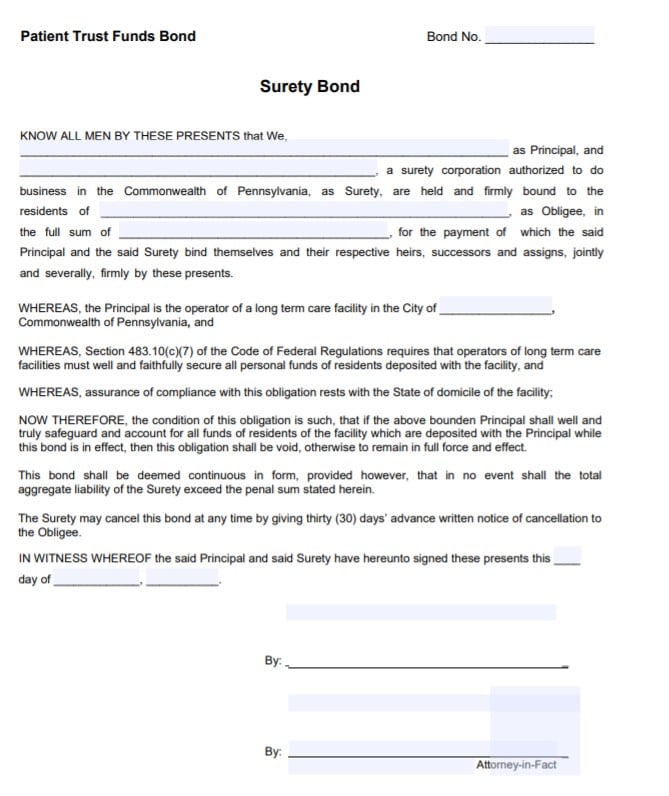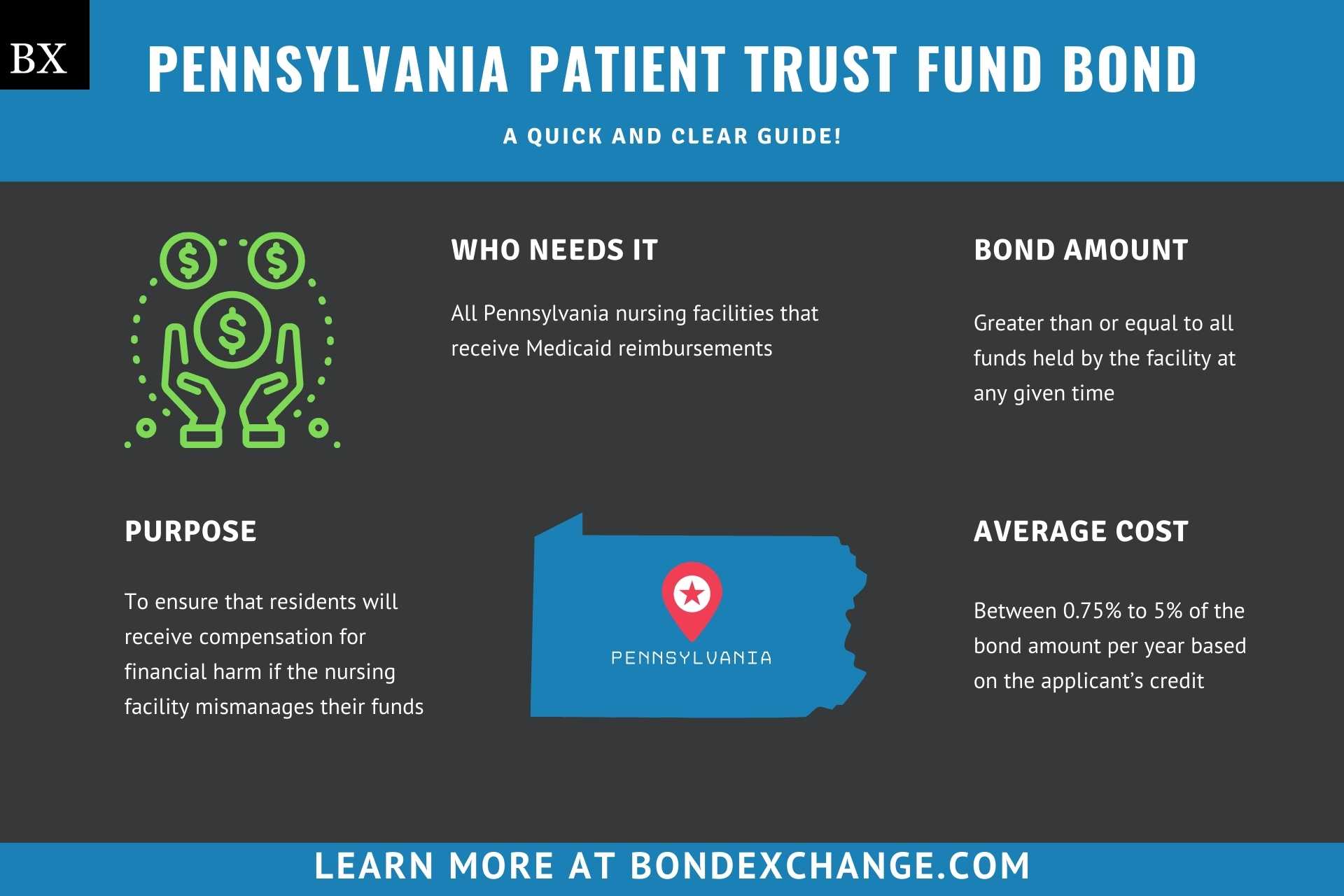Pennsylvania Patient Trust Fund Bond: A Comprehensive Guide
This guide provides information for insurance agents to help their customers obtain a Pennsylvania Patient Trust Fund bond
At a Glance:
- Lowest Cost: 0.75% of the bond amount per year based on the applicant’s credit
- Bond Amount: Greater than or equal to all funds held by the facility at any given time
- Who Needs it: All Pennsylvania nursing facilities that receive Medicaid reimbursements
- Purpose: To ensure that residents will receive compensation for financial harm if the nursing facility mismanages their funds
- Who Regulates Nursing Facilities in Pennsylvania: The Pennsylvania Department of Human Services

Background
Pennsylvania Statute 1187.1 requires all nursing facilities that receive Medicaid payments to enroll as a provider with the Department of Human Services. The Pennsylvania legislature enacted the enrollment requirement to ensure that eligible nursing facilities receive compensation for services that are covered by Medicaid. To ensure residents are not taken advantage of, nursing facilities must purchase and maintain a surety bond to be eligible to receive Medicaid payments. Additionally, federal statute 483.10 requires all long-term care facilities that hold resident funds in a trust account to purchase a surety bond or other similar form of security. However, the federal regulation leaves the implementation and enforcement of this requirement to individual states.
What is the Purpose of the Pennsylvania Patient Trust Fund Bond?
Pennsylvania requires nursing facilities that manage resident funds to purchase a surety bond before enrolling as a Medicaid provider. The bond ensures that residents will receive compensation for financial harm if the nursing facility fails to abide by the regulations outlined in Pennsylvania statute 1187.78. Specifically, the bond protects residents if the nursing facility in any way mismanages their funds. In short, the bond is a type of insurance that protects residents if the nursing facility acts unethically with their money.
How Can an Insurance Agent Obtain a Pennsylvania Patient Trust Fund Bond?
BondExchange makes obtaining a Pennsylvania Patient Trust bond easy. Simply log in to your account and use our keyword search to find the “trust” bond in our database. Don’t have a login? Gain access now and let us help you satisfy your customers’ needs. Our friendly underwriting staff is available by phone at (800) 438-1162, email, or chat from 7:30 AM to 7:00 PM EST to assist you.
At BondExchange, our 40 years of experience, leading technology, and access to markets ensures that we have the knowledge and resources to provide your clients with fast and friendly service whether obtaining quotes or issuing bonds.
Not an agent? Then let us pair you with one!
Click the above image to find a BX Agent near you
Is a Credit Check Required for the Pennsylvania Patient Trust Fund Bond?
Surety companies will run a credit check on the owners of the nursing facility to determine eligibility and pricing for the Pennsylvania Patient Trust Fund bond. Owners with excellent credit and work experience can expect to receive the best rates. Owners with poor credit may be declined by some surety companies or pay higher rates. The credit check is a “soft hit”, meaning that the credit check will not affect the owner’s credit.
How Much Does the Pennsylvania Patient Trust Fund Bond Cost?
The Pennsylvania Patient Trust Fund bond can cost anywhere between 0.75% to 5% of the bond amount per year. Insurance companies determine the rate based on several factors including your customer’s credit score and experience. The chart below offers a quick reference for the bond cost on a $20,000 bond requirement.
$20,000 Patient Trust Fund Bond Cost
| Credit Score | Bond Cost (1 year) | Bond Cost (1 month) |
|---|---|---|
| 800+ | $150 | $15 |
| 625 – 799 | $200 | $20 |
| 600 – 624 | $500 | $50 |
| 575 – 599 | $600 | $60 |
| 500 – 574 | $1,000 | $100 |
*The credit score ranges do not include other factors that may result in a change to the annual premium offered to your customers, including but not limited to, years of experience and underlying credit factors contained within the business owner’s credit report.
Who is Required to Purchase the Bond?
Pennsylvania requires all nursing facilities that manage resident funds and accept Medicaid payments to purchase a surety bond before enrolling as a Medicaid provider. To paraphrase Pennsylvania statute 39.1, a nursing facility is an institution that provides 24-hour nursing care and/or related medical and health services to two or more individuals that need care but do not require hospitalization.

BondExchange now offers monthly pay-as-you-go subscriptions for surety bonds. Your customers are able to purchase their bonds on a monthly basis and cancel them anytime. Learn more here.
How Do Nursing Facilities Enroll as Medicaid Providers in Pennsylvania?
Nursing facilities in Pennsylvania must navigate several steps when enrolling as Medicaid providers. Below are the general guidelines, but applicants should refer to the enrollment statutes for details on the process.
Step 1 – Obtain a Business License
Nursing facilities are required to obtain a business license through the Pennsylvania Department of Health (DOH) prior to enrolling as a Medicaid provider. To obtain a license, nursing facilities must:
1.a Obtain a Certificate of Need authorizing the construction, expansion, or renovation of the facility (if applicable). Certificates of Need must be obtained from the DOH.
1.b After a Certificate of Need has been granted, the facility should contact the DOH to obtain an application form. The DOH will provide the facility with instructions on how to properly complete and submit their application. All Pennsylvania Nursing Facility License applications must include the following items:
-
- The names and addresses of all facility owners (5% interest or higher), officers, and members of the board of directors
- For nonprofits, the names and addresses of all officers and directors as well as the organization’s articles of incorporation including all amendments and changes
- For partnerships, the names and addresses of all partners
- The name, address, and license number of the facility’s administrator
Prior to issuing a business license, the DOH will conduct a survey of the facility to ensure that it is in compliance with all state and federal regulations.
Step 2 – Purchase a Surety Bond
Nursing facilities must purchase and maintain a surety bond in an amount that is greater than or equal to all resident funds held by the facility at any given time. First-time enrollment applicants must use their estimated balance when determining the required bond amount.
Step 3 – Enroll as a Medicaid Provider
Nursing facilities will be eligible to enroll as Medicaid providers after obtaining a business license and purchasing a surety bond. To become a Medicaid provider, nursing facilities must apply through the Pennsylvania Department of Human Service’s Medical Assitance (MA) Program. All applications can be submitted online here.
Owners of facilities that are deemed “high risk” will need to undergo a fingerprint-based criminal background check.
How do Pennsylvania Nursing Facilities Renew Their Licenses and Provider Enrollments?
The DOH will send the nursing facility instructions on how to renew their license prior to its expiration date. Additionally, the Department of Human Services will send the facility instructions on how to revalidate their Medicaid enrollment before it expires.
What are the Insurance Requirements for Nursing Facilities in Pennsylvania?
Pennsylvania does not require nursing facilities to obtain any form of liability insurance as a prerequisite to obtaining a business license or provider enrollment. Nursing facilities that manage residents’ funds and receive Medicaid payments must purchase and maintain a surety bond in an amount greater than or equal to the highest daily balance of all resident funds held on deposit.
How Do Pennsylvania Nursing Facilities File Their Bond?
Nursing facilities should submit their completed bond form, including the power of attorney, electronically when submitting their enrollment application. The surety bond requires signatures from both the surety company that issues the bond and from a representative of the nursing facility. The surety company should include the following information on the bond form:
- Legal name of entity/individual(s) buying the bond
- Surety company’s name
- Name of the nursing facility
- Bond amount
- Date the bond is signed
What Can Pennsylvania Nursing Facilities Do to Avoid Claims Against Their Bonds?
To avoid claims on their bonds, nursing facilities in Pennsylvania must ensure that they properly safeguard and account for all resident funds.
What Other Insurance Products Can Agents Offer Nursing Facilities in Pennsylvania?
Pennsylvania does not require nursing facilities to purchase any form of liability insurance as a prerequisite to obtaining a business license or enrolling as a Medicaid provider. However, most reputable businesses will seek to obtain this insurance anyway. Bonds are our only business at BondExchange, so we do not issue any other types of insurance, but our agents often utilize brokers for this specific line of business. A list of brokers in this space can be found here.
How Can Insurance Agents Prospect for Pennsylvania Nursing Facility Customers?
Pennsylvania conveniently provides a public database to search for active nursing facilities in the state. The database can be accessed here. Contact BondExchange for additional marketing resources. Agents can also leverage our print-mail relationships for discounted mailing services.

